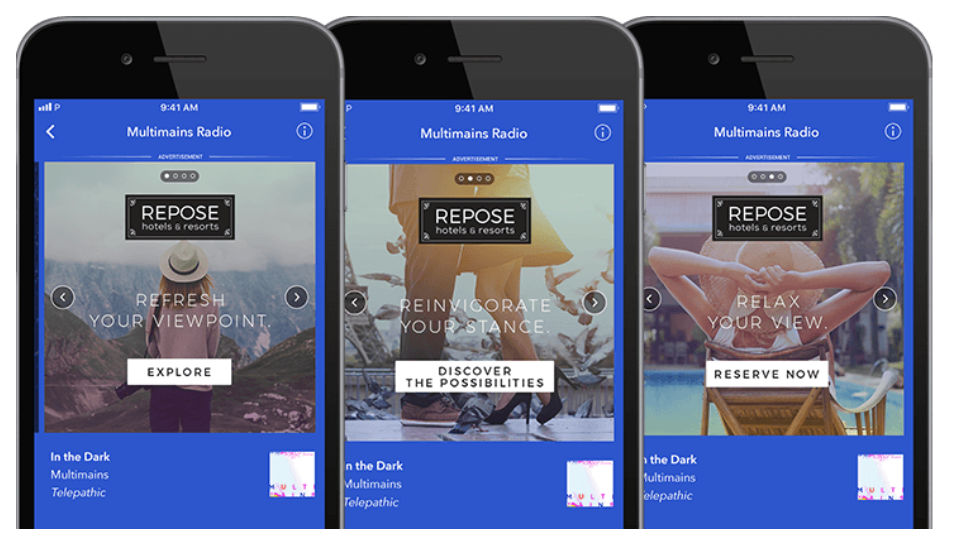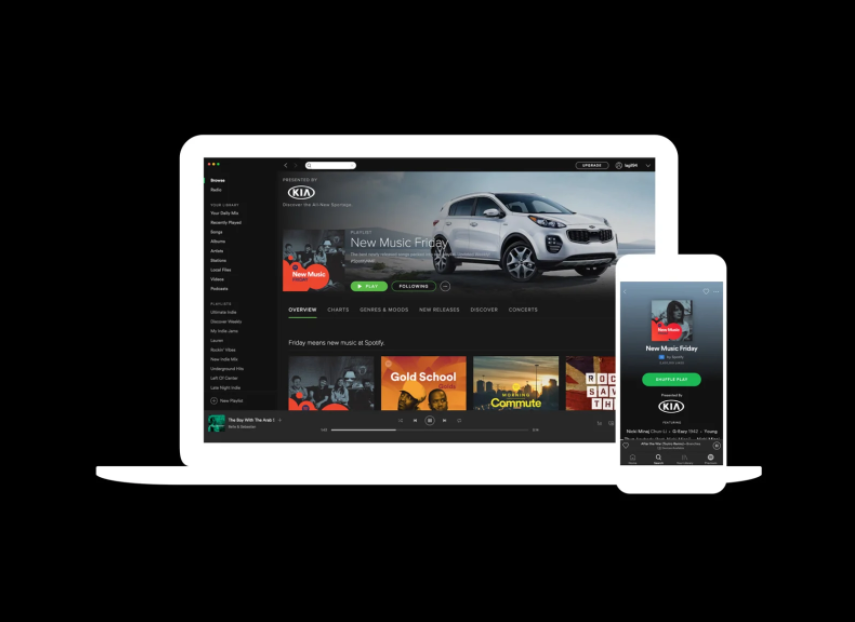Streaming Audio Advertising Guide [History + Tips]


The way consumers are listening to music and consuming content has changed dramatically over the past few years. Gone are the days of taking your Walkman out for a run or even popping a CD into your boombox. Feeling old yet? Technology has evolved, and so has the way we listen to just about everything.
Audio streaming has taken the world by storm and for good reason. By signing up for a platform such as Spotify, Pandora, or Amazon Music (just to name a few), you have the power to access millions of songs, podcasts, and so much more in the audio streaming space with just a few clicks. Advertisers far and wide have taken notice of this growing market and have seen success in reaching consumers throughout the funnel with the use of audio advertisements – but more on that later.
In this article, we’ll cover everything you need to know about streaming audio advertising including [click to jump to a specific section]:
Just before the rise of audio streaming, users were required to download music or audio files in an mp3 format before playing the desired content. Now, with streaming, users can transmit audio on-demand through the Internet with no downloading or permanent storage required.
“Audio streaming is widely used to listen to radio and audio clips from the Internet. It is also used to transmit music from a computer in a home network to a stereo or to the audio component in a home theater. Transmitting from a computer or mobile device to powered speakers via Bluetooth or Wi-Fi is also audio streaming.”
– PCMag
As we briefly covered, the way people consume music has changed dramatically over the years. We’ve gone from vinyl, to radio, to cassette, to CD, to mp3, and now, to streaming audio. Many people debate which streaming audio platform was truly the first-to-market, but from general consensus, Pandora was one of the first big players to make waves in the space. The company, known for creating curated streaming radio content, was a pioneer in the industry and its popularity skyrocketed at an impressive rate.
Not long after Pandora took the music industry by storm, many other streaming music platforms came to fruition like Spotify, Apple Music, iHeartRadio, Amazon Music, and more. Nowadays, consumers are inundated with options when it comes to audio streaming platforms. Take a look at some of the most popular music platforms used by Americans today (below).
For many of us, streaming audio content is a daily occurrence. Consumers stream audio while doing just about anything, like driving, working out, cooking, entertaining, and so much more. Streaming this type of content is fast, simple, and (for those not paying a subscription fee) free. It’s no wonder the number of people using streaming platforms is on the rise. Let’s take a look at a few impressive stats.
Many of the streaming services we all know and love operate on a freemium model, meaning users do not have to pay a subscription fee for content that is ad-supported. If a user decides to pay for a subscription, they will be able to access content ad-free. But in a recent study, it was found that “paid users only listen to slightly more minutes each month on average across each of the platforms analyzed” (Source). This means that the opportunity for advertisers to take advantage of these growing platforms is bigger than ever before.
From the breakdown above, it’s clear that streaming audio is incredibly popular and as a result, many brands have started to work audio streaming advertising into their marketing strategies. But what is audio advertising exactly?
Have you ever been listening to music or a podcast on a streaming service like Spotify or Apple Music and heard an advertisement play? That’s just one example of an audio streaming advertisement. These ads allow advertisers to programmatically insert short advertisements into a variety of audio content.
“With the growth of listenership to streaming audio content, especially in recent years, it’s been an increasingly hot topic with brands. Brands want to know how they can tap into this large audience, which platform best matches their target audience, and what ad types and targeting are available.”
– Carly Fipps, Programmatic Senior Specialist at Tinuiti
Audio advertising is becoming a key focus in many brands’ overall marketing tactics. In fact, “in 2021, digital audio services advertising spending in the United States was expected to amount to 5.59 billion U.S. dollars and is projected to increase to nearly eight billion by 2025” (Source). This is an advertising category definitely worth considering, but what are the various types of audio advertising? Let’s dive into a few options.
There are a variety of choices when it comes to selecting the type of ad you’d like to run on an audio streaming platform. And as these platforms become more advanced and robust, new types are emerging. Let’s break down a few of the top types of audio ads (keep in mind, offerings may differ on each platform).
Audio ads are pre-recorded streaming ads that are usually between 15 to 30 seconds long. They come in three different formats: pre-roll (before the user’s desired content starts playing), mid-roll (played during the middle of the desired content), and post-roll (after the user’s desired content is played). These ads typically include brand imagery and are also accompanied by clickable and trackable CTAs.

Video ads are similar to audio ads, but also include branded video assets. Video ads typically appear when a user is actively browsing content on either the platform’s website or mobile app. Video ads allow consumers to see your brand in motion and typically include clickable CTAs.
Podcast ads, or native ads, are advertisements that are seamlessly weaved into podcast episodes. These ads are typically scripted and read by the specific show’s host(s) and also come in pre-roll, mid-roll, and post-roll formats. This format is great for building brand awareness during big buying events like holidays or even new product launches.
This ad type is becoming increasingly popular as more and more consumers are tuning into podcasts. In fact, according to recent research, 68% of Americans ages 12 and older had listened to online audio in the past month, while 62% had listened in the past week (Source). And according to eMarketer’s latest forecast, podcast ad spending will exceed $2 billion by 2023.
Advertisers are no longer just experimenting with the idea of allocating budget to podcast ads. This thriving medium is becoming a staple in many marketers’ advertising strategies and more growth is on the horizon.
“Podcasts have definitely become more popular, especially in 2020 since so many of us were at home. Podcasts are essentially untapped opportunities for many brands and the time to get into the market is now before adoption becomes even more popular. It’s a great way to tap into a different audience that we couldn’t reach through traditional streaming audio channels.”
– Carly Fipps, Programmatic Senior Specialist at Tinuiti
It’s also important to keep in mind that certain audio partners are able to aid in the creation of both audio ads and podcast ads. Also, podcast ads, in particular, can be recorded by voice actors that the audio partners have on staff.
Brands have the ability to sponsor specific playlists or stations (depending on platform) in order to connect with consumers within a targeted demographic. Within these sponsorships, brands can showcase branded native media while also including in-playlist/station advertisements for increased reach.

Companion ads allow brands to include a display banner advertisement while their audio or video ad is running. This allows for additional brand visibility.
These are just a few of the ad options when it comes to streaming audio advertising. With the help of the right partner, you can find customizable solutions that best suit your brand’s specific marketing objectives.
If you’re still wondering if audio streaming ads are the best solution for your business, let’s jump into a few top advantages of this medium.
Streaming is the way of the future, and the time to get on board is now. Still need a little convincing? Here are some of the top advantages of audio advertising:
Consumers are spending more time than ever before listening to streaming audio. In fact, eMarketer reported that in 2021, people spent an average of 86 minutes per day listening to digital audio. Consuming audio content in a digital format has made the listening process seamless for many consumers and the engagement is incredibly high. For example, “nearly 60% of listeners say they pay more attention to ads they hear on Spotify than on the radio” (Source). It was also reported that, “54% of podcast listeners were either somewhat or much more likely to consider a brand after hearing it advertised on a podcast” (Source).
With streaming audio, advertisers have the ability to target consumers on a deeper level. Marketers can not only just target by age, gender, and location, but also by consumers’ listening habits, past interactions, preferred genres, specific niches, and so much more. These impressive targeting capabilities allows brands, like yours, to resonate with target audiences for a more personalized touch and an enhanced ROAS.
When compared to traditional radio advertising, programmatic audio advertising is typically more cost effective all while providing you with trackable insights – giving you the most bang for your buck.
Unlike many other types of advertising, users cannot block your ads from playing. If they signed up for an ad-supported streaming service, there are unskippable ads that a user must listen to before they can move on to their desired content. This means your brand’s message is sure to be heard.
Another key benefit of streaming audio advertising is that there are robust tracking and measurement functions. Let’s dive into how to measure the impact of your audio ads below.
Audio streaming platforms have enhanced measurement capabilities so you know exactly where and how your marketing dollars are being utilized. But what KPIs should you be measuring with this advertising medium? Let’s break them down (keep in mind, measurement capabilities will differ by platform).
Now’s the time to harness the power of audio streaming ads to accelerate your brand’s performance. It’s clear that the popularity of music streaming platforms is higher than ever before and it’s a great place to reach potential customers and increase brand awareness.
“What really sets Tinuiti apart in the realm of streaming audio campaigns is our strong partnerships with some of audio’s largest players: Spotify and Pandora, for example. These continued relationships allow us to be top of mind when new products arise and ensure campaigns are set up with success due to the power of knowledge sharing and programmatic expertise.”
– Carly Fipps, Programmatic Senior Specialist at Tinuiti
Interested in adding programmatic audio ads to your next campaign? We like where your heads at and we’d love to help kickstart your brand into the world of streaming. Visit our TV & Audio services page or contact us directly to get started.
